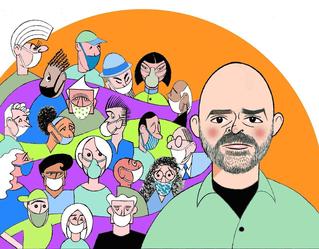
Center Director O. Carter Snead's latest book, What It Means to be Human: The Case for the Body in Public Bioethics (Harvard University Press, 2020), continues to be widely discussed in the media, including most notably in the pages of the Wall Street Journal. In his November 8, 2020, review, Yuval Levin declared the book to be “among the most important works of moral philosophy produced so far in this century.” In December 2020, the paper named it as one of the “Top Ten Books of 2020.”
Professor Snead was featured again in the WSJ on June 18, 2021, in a “Weekend Interview” with editorial page writer Barton Swaim, discussing implications of his book for the response to the COVID-19 global pandemic.
According to Swaim, “Mr. Snead’s volume helped explain the bizarre and at times perverse response of prosperous Western nations to the pandemic: the long discontinuation of economic life, the belief that pixilated screens can facilitate human relationships, the prohibitions on ordinary social interactions, the fetishization of masks.”
Swaim continues, writing that “Snead’s premise and theme is that humans are embodied creatures, not mere wills and intellects. That premise stands in contrast with the dominant modern worldview, which he calls 'expressive individualism': the belief that the human self 'is not defined by its attachments or networks of relations, but rather by its capacity to choose a future pathway that is revealed by the investigation of its own inner depths of sentiment. . . . Because this self is defined by its capacity to choose, it is associated fundamentally with its will and not its body.'”
In the interview, Professor Snead expressed the concern that while it is, of course, essential to prevent the spread of infection by such practices as mask wearing and social distancing, due consideration must also be given to core human needs such as physical presence (especially with dying loved ones), and the dignity and meaning of work that requires in-person contact. He also lamented the corrosion of personal relationships and civility that is aggravated by the “anonymous, unaccountable refuge of social media.”
Swaim's full interview is available on the Wall Street Journal website.
Originally published by at ethicscenter.nd.edu on June 22, 2021.